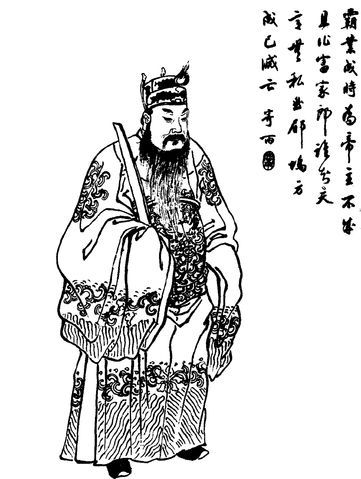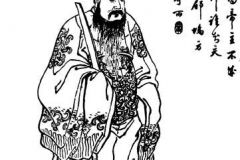Lifespan: (?-192), given that his mother was murdered at age 90 when he was assassinated, she probably was no older than 30 when he was born, gives him an approximate age of 60-70 years old at death.
Birth/Death place: born in Lintao (modern Minxian, Gansu). Assassinated by his foster son, Lu Bu, at Chang’an.
Dong Zhuo 董卓, courtesy name Dong Zhongying 董仲穎, was a powerful minister during the last decades of the Eastern Han period 後漢 (25-220). Dong hailed from Lintao 臨洮 (modern Minxian 岷縣, Gansu), a region at the border to the Tangut Qiang 羌 tribes. He spent his the early years of his career in this region as a military commander of the border garrisons.
During the last years of the reign of Emperor Huan 漢桓帝 (r. 146-167), he was promoted to gentleman of the palace guard (yulinlang 羽林郎), and then upon recommendation by the Leader of the court gentlemen (zhonglangjiang 中郎將) Zhang Huan 張奐, to court attendant (langzhong 郎中), and took over the post of commandant of the center (wuji xiaowei 戊己校尉), regional inspector (cishi 刺史) of the province of Bingzhou 幷州, and was then appointed governor (taishou 太守) of the commandery of Hedong 河東 in the center of the empire.
After the outbreak of the Yellow Scarves 黃巾起義 uprising and during the rebellion of Bian Zhang 邊章 and Han Sui 韓遂, he successfully put down the rebellions and pacified the northern part of China. For these merits, he was appointed chamberlain for the palace revenues (shaofu 少府) in 189, but he declined. Instead, Emperor Ling 漢靈帝 (r. 167-188), facing death, appointed him regional governor (mu 牧) of Bingzhou—a position in which he was able to build up a powerful army.
After Emperor Ling’s death in 189, general-in-chief (da jiangjun 大將軍) He Jin 何進 and metropolitan commandant (sili xiaowei 司隷校尉) Yuan Shao planned to extinguish the powerful eunuch clique at the court and invited Dong Zhuo to participate. The plot was discovered by the eunuchs, and He Jin was executed. Yuan Shao took action, assailed the imperial palace and massacred all eunuchs. Zhang Rang 張讓 and Duan Gui 段珪 seized the Infant Emperor (Shaodi 少帝, r. 188-189) Liu Bian 劉辯 and the Prince of Chenliu 陳留, Liu Xie 劉協, and escaped from the capital.
At this time, Dong Zhuo marched his troops towards the capital. He convinced Lu Bu 呂布 to join him and to assassinate Ding Yuan 丁原, the chamberlain for the imperial insignia (zhijinwu 執金吾), and seized the two imperial children. Dong Zhuo installed the Prince of Chenliu, Liu Xie, as the new emperor (known as Emperor Xian 漢獻帝, r. 189-220). Dong Zhuo was made Defender-in-chief (taiwei 太尉) and Counsellor-in-chief (xiang 相) and was given the title of Marquis of Mei 郿侯. As the most powerful person of the empire, Dong Zhuo abused his position, embezzled funds and built up his own factual empire. The continuing rebellions of adherents of the Yellow Scarves roamed the eastern part of the empire without that any army was able to suppress them.
These disturbances lead to many officials rebelling against Dong Zhuo’s abuse of Imperial power—warlords such as Sun Fu 孫馥, Yuan Shao, and Sun Jian 孫堅. Dong Zhuo therefore burnt down the capital Luoyang 洛陽 and transferred the court back to the ancient capital Chang’an 長安 (modern Xi’an, Shaanxi). In 191, he had made himself Grand preceptor (taishi 太師), which was the highest position of state officials and allowed him to wear the same robes as the emperor and to drive in imperial chariots. Dong Zhuo also managed to have all his male relatives given titles of nobility.
Dong Zhuo’s foster-son Lu Bu, the Minister of education (situ 司徒) Wang Yun 王允, and the vice director of the secretariat (puye 僕射 [sic]) Sun Rui 孫瑞 thereupon conspired and decided to assassinate Dong Zhuo, which happened during a court session in 192. His death was frantically celebrated throughout the empire (Tong 1992, vol. 1, p. 185)(Fan c. 450)(Chen c. 280).
Sources:
Chen Shou, et al. (c. 280). Sanguozhi “Records of the Three Kingdoms”. Additions were added by Pei Songzhi (c. 400), named: Sanguozhi zhu “Annotations to Records of the Three Kingdoms”.
Fan Ye, et al (c. 450). Hou Hanshu “Book of the Later Han”, a.k.a. “History of the Later Han”.
Tong Chao (1992). Zhongguo da baike quanshu, Zhongguo lishi. Beijing/Shanghai: Zhongguo da baike quanshu chubanshe. Chinaknowledge.de, March 8, 2011. Accessed Jan. 2020 – https://www.chinaknowledge.de/History/Han/personsdongzhuo.html
ZT: Zantam03 (2011). Portraits of Characters from a Qing Dynasty edition of Romance of the Three Kingdoms, Zengxiang Quantu Sanguo Yanyi (1896). Gongjin’s Campaign Memorials (website). Accessed Jan 2020 – https://threekingdoms.wikia.org/wiki/Gongjin%27s_Campaign_Memorials. Community content is licensed under the Creative Commons Attribution-Share Alike License 3.0 (Unported) (CC-BY-SA).



